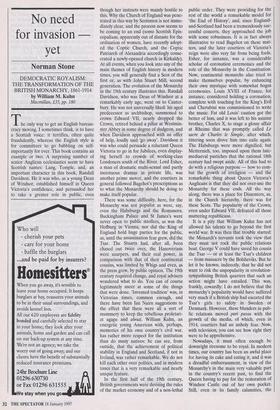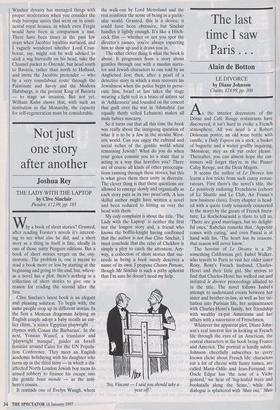No need for invasion yet
Norman Stone
DEMOCRATIC ROYALISM: THE TRANSFORMATION OF THE BRITISH MONARCHY, 1861-1914 by William M. Kuhn Macmillan, £35, pp. 180 The only way to get an English bureau- cracy moving, I sometimes think, is to have a Scottish voice: it terrifies, often quite fraudulently, whereas the English style is for committees to go babbling on self- importantly for ever. This book contains an example or two. A surprising number of senior Anglican ecclesiastics seem to have Scottish names: Lang, Temple, and, an important character in this book, Randall Davidson. He it was who, as a young Dean of Windsor, established himself in Queen Victoria's confidence, and persuaded her to take a greater role in public, even though her instincts were mainly hostile to this. Why the Church of England was pene- trated in this way by Scotsmen is not imme- diately clear, and the process now seems to be coming to an end (some Scottish Epis- copalians, apparently out of distaste for the ordination of women, have recently adopt- ed the Coptic Church, and the Coptic Patriarch of Alexandria accordingly conse- crated a newly-opened church in Kirkaldy). At all events, when you look into any of the main themes of English history in modem times, you will generally find a Scot of the first or, as with John Stuart Mill, second generation. The evolution of the Monarchy in the 19th century illustrates this. Randall Davidson, who was Dean of Windsor at a remarkably early age, went on to Canter- bury. He was not universally liked: his aged predecessor as archbishop, summoned to crown Edward VII, nearly dropped the Crown, retired behind a pillar at Westmin- ster Abbey in some degree of dudgeon, and when Davidson approached with an offer of help, loudly said 'go away'. Davidson it was who could persuade a reluctant Queen Victoria to go in for Jubilees, even display- ing herself to crowds of working-class Londoners south of the River. Lord Esher, a man of dramatic multi-sexual and partly incestuous dramas in private life, was another prime mover, and the courtiers in general followed Bagehot's prescriptions as to what the Monarchy should be doing to make itself popular.
There was some difficulty, here, for the Monarchy was not populist as were, say, even the Habsburgs and the Romanovs. Buckingham Palace and St James's were never open to public strollers, as was the Hofburg in Vienna, nor did the King of England hold huge parties for the public, as, until the assassination fear grew, did the Tsar. The Stuarts had, after all, been chased out twice over, the Hanoverians were usurpers, and their real power, in comparison with that of their continental cousins, was limited by Whigs and even, as the press grew, by public opinion. The 19th century required change, and royal advisers wondered what to do. You can of course legitimately sneer at some of the things that were done. 'Invented tradition' was, in Victorian times, common enough, and there have been Ian Naim suggestions to the effect that these were all a sort of mummery to keep the rebellious proletari- at agape and abruti. William Kuhn, an energetic young American with, perhaps, memories of his own country's civil war, has rather more respect for the institution than do many natives: he can see, from outside, that the achievement of political stability in England and Scotland, if not in Ireland, was rather remarkable. We do not kill each other over politics, and in modern times that is a very remarkable and nearly unique feature.
In the first half of the 19th century, British governments were devising the rules of the market economy and of a non-lethal public order. They were providing for the rest of the world a remarkable model for `the End of History', and, since England- and-Scotland had been a tremendously suc- cessful concern, they approached the job with some robustness. It is in fact always illustrative to read Bagehot on these mat- ters, and the later courtiers of Victoria's reign were also very far from being fools. Esher, for instance, was a considerable scholar of coronation ceremonies and the role of the Monarchy in the Constitution. Now, continental monarchs also tried to make themselves popular, by enhancing their own mystique with somewhat bogus ceremonies. Louis XVIII of France, for instance, considered holding a coronation, complete with touching for the King's Evil and Cherubini was commissioned to write the music. Fat old Louis' caution got the better of him, and it was left to his asinine brother, Charles X, to stage a glossy affair at Rheims that was promptly called Le sacre de Charles le Simple, after which, tittering soon drove him into exile again. The Habsburgs were more dignified, but Mettemich, too, imposed upon them late- mediaeval pastiches that the rational 18th century had swept aside. All of this had to do with a religious purpose — how to com- bat the growth of irreligion — and the remarkable thing about Queen Victoria's Anglicans is that they did not over-use the Monarchy for these ends. All the way along, there was a place for Dissenters, as, in the Church hierarchy, there was for these Scots. The popularity of the Crown, even under Edward VII, defeated all those muttering republicans.
It is a pity that William Kuhn has not allowed his talents to go beyond the first world war. It was then that trouble started: the Monarch's servants took the view that they must not rock the public relations boat. George V could have saved his cousin the Tsar — or at least the Tsar's children — from massacre by the Bolsheviks. But he let it be known, indirectly, that he did not want to risk the unpopularity in revolution- sympathising British quarters that such an action might have entailed. This was, frankly, cowardly: I do not believe that the monarchy's popularity would have suffered very much if a British ship had escorted the Tsar's girls to safety in Sweden or Denmark. However, these blunders in pub- lic relations moved pari passu with the growth of the media, of which, even in 1914, courtiers had an unholy fear. Now, with television, you can see how right they were to be apprehensive.
Nowadays, it must often enough be downright tiresome to be royal. In modern times, our country has been an awful place for having its cake and eating it, and it was a dreadful embarrassment, in view of the Monarchy's in the main very valuable part in the country's recent past, to find the Queen having to pay for the restoration of Windsor Castle out of her own pocket. Still, even in its family calamities, the Windsor dynasty has managed things with proper moderation when you consider the truly baroque antics that went on in conti- nental royal houses, in which even Fergie would have been in comparison a nun. There have been times in the past few years when Jacobite loyalties surfaced, and I vaguely wondered whether Lord Cran- borne, say, might not be well advised to stick a wig hurriedly on his head, take the Channel packet to Ostende, but head south to Bavaria, rather than north to Holland, and invite the Jacobite pretender — who by a very roundabout route through the Palatinate and Savoy and the Modena Habsburgs, is the present King of Bavaria — to stage an invasion. But not yet. William Kuhn shows that, with such an institution as the Monarchy, the capacity for self-regeneration must be considerable.



























































 Previous page
Previous page